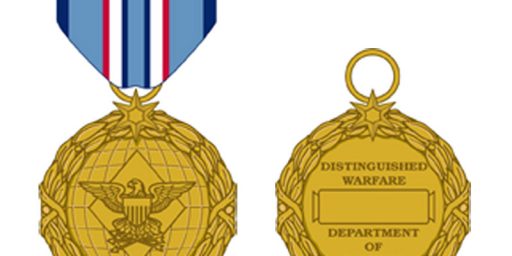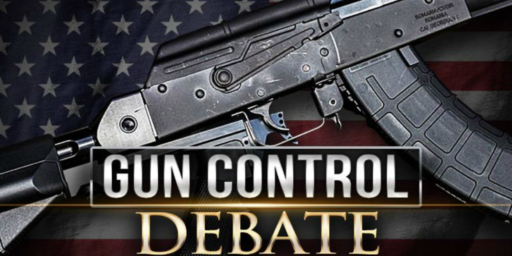Thurlow Responds
The Swifty saga continues:
Greg Ransom (PRESTOPUNDIT)
Statement By Swift Boat Veterans for Truth Member Larry Thurlow:
I am convinced that the language used in my citation for a Bronze Star was language taken directly from John Kerry’s report which falsely described the action on the Bay Hap River as action that saw small arms fire and automatic weapons fire from both banks of the river.
To this day, I can say without a doubt in my mind, along with other accounts from my shipmates — there was no hostile enemy fire directed at my boat or at any of the five boats operating on the river that day.
I submitted no paperwork for a medal nor did I file an after action report describing the incident. To my knowledge, John Kerry was the only officer who filed a report describing his version of the incidents that occurred on the river that day.
It was not until I had left the Navy — approximately three months after I left the service — that I was notified that I was to receive a citation for my actions on that day.
I believed then as I believe now that I received my Bronze Star for my efforts to rescue the injured crewmen from swift boat number three and to conduct damage control to prevent that boat from sinking. My boat and several other swift boats went to the aid of our fellow swift boat sailors whose craft was adrift and taking on water. We provided immediate rescue and damage control to prevent boat three from sinking and to offer immediate protection and comfort to the injured crew. [More at link]
It’s certainly conceivable that he got his awards after he got home. My Bronze Star was awarded to me months after the first Gulf War (indeed, VII Corps, to which my battalion was attached during the war, was disbanded as the medals trickled out) and I got a campaign star for my Southwest Asia Service Medal and two foreign awards well after I had left the military. Further, until the flap over the Kerry Purple Hearts started months ago, I had never heard of people putting in for their own medals. (Must be a Navy thing?)
Regardless, this sheds no light on the charges made against Kerry. If the rules that were in effect in 1991 applied during the Vietnam era, a three-star signed off on the Bronze Star. Presumably, the citation for the award passed through the chain of command first without anyone questioning it. And, indeed, a Bronze Star could well have been warranted for nothing more than a rescue operation such as Thurlow describes. Aside from the additional “war story” factor, it’s unclear why Kerry (or anyone else) would see the need to add incoming small arms fire to the account.
(Hat tip: Little Miss Attilla)
Update: Tim Kelly asks,
Now, granted I’ve never served in the military, but am I to understand that you can get a medal without even knowing what you did to get the medal?
Contrary to widespread belief, a Bronze Star ain’t that big of a deal. The award was created late in World War Two so that there would be an award for ground pounders to balance out the Air Medal, which was given to air crewmenfor every flight. [A commenter correctly notes that my memory here was faulty. The criteria for the award are here. Theoretically, the criteria were similar to those established for the Bronze Star. In practice, however, it was usually awarded each time a crewman completed some number of flights, which varied by unit.]
General George C. Marshall, in a memorandum to President Roosevelt dated February 3, 1944, wrote: “The fact that the ground troops, Infantry in particular, lead miserable lives of extreme discomfort and are the ones who must close in personal combat with the enemy, makes the maintenance of their morale of great importance. The award of the Air Medal have had an adverse reaction on the ground troops, particularly the Infantry Riflemen who are now suffering the heaviest losses, air or ground, in the Army, and enduring the greatest hardships.” The Air Medal had been adopted two years earlier to raise airmen’s morale.
The Bronze Star wound up being more prestigious and harder to get than an Air Medal, but it’s not exactly the Medal of Honor. Indeed, it’s not usually even awarded for valor; usually, it’s for “Meritorious Service” or “Meritorious Achievement.” They were awarded by the bushel in Vietnam, so there was a lag in getting them out. Award citations at lower levels tend to be rather boilerplate “Great credit on the United States Navy and the United States of America” and so forth. Until you get to Silver Star, Navy Cross, or Medal of Honor territory, they don’t really say much. (The Kerry/Thurlow award is an extreme exception to that rule.)
The paperwork recommending Kerry’s Bronze Star is available at his site in PDF format. For some reason, the text select tool won’t work on it. Ditto the Bronze Star citation itself. It is signed by Vice Admiral Elmo Zumwalt.
One part of Thurlow’s story is confirmed by looking at the docs: He, Kerry, and an RD1 R.E. Lambert were all put in for the Bronze Star simultaneously, under authority of LTCDR Elliot, using the same citation. It would indeed be surprising if Thurlow’s award, therefore, said something different than Kerry’s.





Yes James, but there’s one important piece that’s missing… You’re right that Bronze Stars can be earned for service and support ops, rather than life-risking combat forays, but if you look all the way through the .pdf file, you’ll see the last line reads:
“Lieutenant (junior grade) KERRY is authorized to wear the Combat “V”.”
I don’t know what Thurlow’s citation says, and I don’t know what the rules were back in Vietnam, but I know that today, you just can’t get the ‘V’ device without coming under enemy fire.
Has anyone spoken to LtCdr Elliot about these citations?
Legion: Thurlow’s citation should be IDENTICAL–they’re written up on the same request form.
A combat “V” is a big deal in the Army but apparently not in the Navy. During the whole fiasco with ADM Boorda, we learned that guys were getting Bronze Stars with “V” devices who had never left ship or come under fire.
I’m not saying that’s the case with Kerry–he pretty clearly took fire more than once, and had already earned a Silver Star before this action, so the utility of lying to get a lesser award escapes me. I’m just saying that it’s conceivable that Thurlow got a Bronze Star with “V” and thought it was for the rescue incident, minus exploding mines and small arms fire.
The awards system is very subjective, despite appearances to the contrary, 2 people doiing the same mission can receive 2 different awards depending on rank, postion, the rank of the recommender, and just how well the recommendation is written. Generally, unless I personally know the awardee and the circumstances surrounding the award, I don’t get too excited about the medals unless they are Silver Star and above.
SFC SKI: Agreed. I got a Bronze Star as a 1LT in Desert Storm for things that only netted an ARCOM for my crew chiefs. Thurlow and Kerry were
LTJG’s recommended for the same award on the same orders, though, so I expect they got the same citation.
Re Thurlow’s merits (as compared to Kerry’s): On-scene observer Van Odell has a new statement up on the SwiftVets’ website in which he points out:
Odell’s take is that despite the absence of enemy small arms fire, Thurlow deserved his Bronze Star, while Kerry’s action in fleeing, then plucking Rassmann back out of the water (who Kerry has elsewhere claimed fell overboard when Kerry’s boat made a high-speed turn) was routine.
The question that remains, of course, is whether it was Kerry who wrote up the narrative that got incorporated into all three Bronze Star citations and claimed that they were receiving enemy small-arms fire from the shore.
I’m told that John O’Neill pointed out on tonight’s News Hour interview that the rescue of PCF 3 took an hour and a half to complete. Awfully long time for five boats to be taking small arms fire from both banks with nobody being hit, nor any of the boats displaying bullet holes, huh?
True; of all the services I’m least familiar with the Navy. It’s even rarer for us AF types to see a ‘V’. But Odell’s comments don’t make any sense; as you say, both men’s citations were identical. I can’t see it happening today, but is there any possibility that back in ‘Nam people (Kerry or whoever) really did write their own medal submissions? I thought those had to be submitted by the senior officer present.
I spent almost 22 years in the Navy (1967-1989) and it was not at all uncommon for people to write themselves up for awards. It was even more common to be told to write your own Personnel Evaluation (or EER/OER for you AF and Army types). I never put myself in for a medal, but I had to write my own Eval many times.
Air Medals were not awarded for every mission in WWII, otherwise my father would have had 45 instead of 2. It was a secondary award given for accomplishing a significant mission. Example, in the Battle of the Bismarck Sea, first wave pilots got DFC’s, co-pilots got a mix of DFC’s and Air Medals, and gunners got Air Medals. Second wave pilots and co-pilots got Air Medals, gunners got a firm handshake. By Vietnam, Air Medals were given for flying a certain number of missions, 20 in Laos and Vietnam and 10 over North Vietnam. This was the criteria 1967-1969.
Bronze Star was developed for and awarded in WWII to all who had earned a Combat Infantryman’s Badge. It subsequently is for meritorious service in a combat zone involving valor, actually under fire, or just being very good at doing something. The USAF used the BSM in Vietnam as something generally for company grade officers while field level officers got a Legion of Merit.